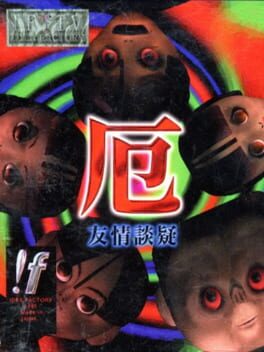This review contains spoilers
A bizarre nightmare of mounting absurdist nihilism heavily influenced by the works of classic horror manga (going so far as to have Hideshi Hino, one of the kings of that era, in charge of character design), Yaku gradually reveals itself as a deeply metatextual curse; a malevolent, mischievous curse intent on tormenting the player.
Making heavy use of the zapping system, the game taunts answers, meaning, endings. It concludes with a literal question mark and directly gives the players hints as to a perfect run--a complex playthrough where all the right choices are made at all the right times--and promises a "secret" that is your job to uncover. But none of that is true.
Answers don't exist.
Meaning is a lie.
The player is made to replay its story of nonsense nightmares, repeat tragedy and despair, actualize the cycle of violence and pain that defines that defines the characters all in some impossible effort for satisfaction and a conclusion that doesn’t exist.
It is cruel and frustrating, a shambling game that feels like it was constructed with rotting wood and frayed tape, developed by someone raised in the dirt beneath society. It laughs as it pushes against one of the fundamental understanding of games (one which has only become more and more pronounced in the mainstream space): that they should be fun, satisfying, make the player feel good and respected. It is a game that wants to be hated.
At one point the villain looks past the screen and into you, the player. They tell you that you can hate the game, you can tell your friends it is awful, write the worst reviews you can imagine, do everything you can to tank its reputation; they tell you it doesn’t bother them because it’s all a game; it, and the curse within it, is one big lie of make-believe told through code, so none of it matters a single bit…right?
Today, the game is remembered in Japan as a classic of kusoge.
The curse spreads.
Making heavy use of the zapping system, the game taunts answers, meaning, endings. It concludes with a literal question mark and directly gives the players hints as to a perfect run--a complex playthrough where all the right choices are made at all the right times--and promises a "secret" that is your job to uncover. But none of that is true.
Answers don't exist.
Meaning is a lie.
The player is made to replay its story of nonsense nightmares, repeat tragedy and despair, actualize the cycle of violence and pain that defines that defines the characters all in some impossible effort for satisfaction and a conclusion that doesn’t exist.
It is cruel and frustrating, a shambling game that feels like it was constructed with rotting wood and frayed tape, developed by someone raised in the dirt beneath society. It laughs as it pushes against one of the fundamental understanding of games (one which has only become more and more pronounced in the mainstream space): that they should be fun, satisfying, make the player feel good and respected. It is a game that wants to be hated.
At one point the villain looks past the screen and into you, the player. They tell you that you can hate the game, you can tell your friends it is awful, write the worst reviews you can imagine, do everything you can to tank its reputation; they tell you it doesn’t bother them because it’s all a game; it, and the curse within it, is one big lie of make-believe told through code, so none of it matters a single bit…right?
Today, the game is remembered in Japan as a classic of kusoge.
The curse spreads.
